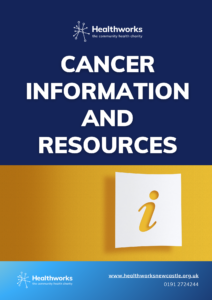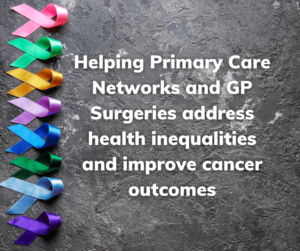Cancer Awareness
Did you know that every two minutes someone in the UK is diagnosed with cancer? That’s a pretty shocking statistic and illustrates why our awareness raising work is so important in helping reduce people’s risk of developing cancer!
Through our cancer awareness work, we are helping communities and workplaces across the North East become more informed about the signs and symptoms of cancer and the importance of screening in reducing risk.
3 ways you can help us raise cancer awareness:
1. Book a free Cancer Awareness Session

Free Interactive Cancer Awareness Sessions
Learn about cancer awareness for free! Our sessions are available to people, workplaces or community group based in Newcastle or Gateshead and other parts of the North East (please check with us to see if we cover your area).
With information learnt through Cancer Research UK’s training programme, Talk Cancer, these sessions can help equip people to have impactful cancer conversations with others.
In addition to in-person sessions, we can also host 45 minute Cancer Awareness group sessions virtually. Since we launched them they have been hugely popular with the groups who have taken part, and as a result we have now extended this service.
In person and virtual Cancer Awareness Sessions are available to groups and organisations in Newcastle and Gateshead (and some other areas, please contact us to see if we cover your area. Participants will receive a Healthworks Cancer Awareness Certificate of Achievement for participating so this is a great way to bring groups and teams together and develop individuals skills and knowledge further.
Please contact us at [email protected] to ask us about these sessions.
2. Access and share our free cancer awareness resources

Enrol on our free online Cancer Conversations course
Join the hundreds of people who have completed our free online Cancer Conversations training
Our Cancer Conversations course is a free online awareness session that has been designed to raise awareness of the signs, symptoms and risks of many common cancer types and also help people feel more confident to spread the word and have impactful cancer conversations with others.
What people are saying about Cancer Conversations:
I thought I knew enough about preventing cancers for myself and my family- this course captured my interest from the onset and informed me of signs, symptoms and facts that I hadn’t thought about it. I will certainly spread the word. Thanks to everyone involved
Excellent awareness session – doesn’t take too long but provides important and relevant information. The quizzes are a great tool for checking understanding. It was refreshing to see that skin cancer is mentioned.
Useful links to excellent additional resources.Highly recommend the course. Lots of facts to learn and myth busting info for all ages.
A great resource to share, I now know many of the signs to look for and would be happy to share this information with others.
Enrol for free and help us spread the word!
Free information and resources

Download our Information and Resource list to access further information and support.
Access our ‘Take a Minute Videos’ on YouTube
To help get the message out there to as many people as possible, we have launched a series of Take a Minute videos on You Tube. Each one is around one minute in length and they focus on a range of common cancers and the importance of:
- Knowing your own body
- Attending screening
- Cutting your risk
The full playlist is available on our You Tube Channel (don’t forget to subscribe to get be the first to see our new videos).
3. Become a North East Community Cancer Champion
Our Community Cancer Champions are volunteers who work across the region and raise awareness about cancer among their family, friends, neighbours and work colleagues. They do this by spreading key messages through word of mouth and information distribution and they can also signpost people to local services and support people to seek early medical assistance where appropriate.

Become a Community Cancer Champion
Our team offers free Community Cancer Champion training (in Newcastle and Gateshead) which covers common types of cancers, reducing the risk of getting cancer, the importance of early detection and cancer screening.
If you would like to enquire about Community Cancer Champion Training please contact us at [email protected]
Reducing your risk of developing cancer
There are lots of ways you can help reduce the risk of developing many types of cancers, and you can start taking steps today with our support!
These include:
- Stopping smoking
- Healthy eating
- Getting more active
- Reducing your alcohol intake
- Taking up your screening appointment
- Checking yourself regularly
- Seeing your GP if you notice anything unusual for you
If you want to find out more about any of our services and how we can support you achieve a healthier lifestyle, please contact us.
Common cancers: signs, symptoms and reducing risk
We want to tell as many people as we can about the signs and symptoms of various cancers and also the importance of taking up screening invites when received. Currently the NHS offers screening routinely for three cancers – bowel, cervical and breast – and one of our key aims is to promote take up of these screening services.
In addition to attending screening when invited, it’s really important that you know your own body from head to toe so that you can check for anything that’s unusual for you.
Breast Cancer
According to the NHS, Breast cancer is the most common type of cancer in the UK. Most women diagnosed with breast cancer are over the age of 50, but younger women can also get breast cancer. Around 1 in 8 women are diagnosed with breast cancer during their lifetime, however there is a good chance of recovery if it’s detected at an early stage.
That’s why it’s vital that women check their breasts regularly for any changes and always have any changes examined by a GP, and if you are invited for screening then please go!
This is a great video explaining what happens at a breast screening appointment:
It’s important to check your breasts regularly and if you are not sure how to check your breasts or what you are looking for, Coppa Feel! has a great video to show you how. It’s also worth remembering that men can get breast cancer too, so it’s important that men check themselves regularly and seek medical advice if they find anything that is unusual!
If you’d like to find out more there is some great online information available from the NHS, Cancer Research UK. the Pink Ribbon Foundation and MacMillan Cancer Support.
Download our breast cancer fact sheet.
Cervical Cancer
Cervical cancer develops in a woman’s cervix (the entrance to the womb from the vagina) and mainly affects sexually active women aged between 30 and 45. Our Take a Minute video highlights some of the signs and symptoms and the importance of screening.
Cervical screening (some people may call this a “smear test”) is the best way you can reduce you risk of developing cervical cancer! They are nothing to worry about, only take minutes and contrary to popular belief they are not painful! Invites are sent out every three years and it is vital you attend your screening as it really could save your life!
If you’d like to find out more there is some great online information available from the NHS, Cancer Research UK, the National Cervical Cancer Coalition and MacMillan Cancer Support.
Jo’s Cervical Cancer Trust has some great videos and resources too.
Download our cervical cancer fact sheet.
Bowel Cancer
Bowel cancer is one of the most common types of cancer diagnosed in the UK, it can affect men and women and most people diagnosed with it are over the age of 60. This Take a Minute video tells you about what to look out for and how you can help cut your risk of developing bowel cancer.
To help reduce the number of bowel cancer cases the NHS sends out a testing kit to all adults aged 60 to 74 every two years. While you may not like the idea of the test it’s really important that you do it to help detect bowel cancer so you can get the treatment you need.
This video from Cancer Research UK helps to explain the test and how to do it.
You can also get information about how to do the test in other languages on the Gov.UK website.
If you’d like to find out more there is some great online information available from the NHS, Cancer Research UK, and Bowel Cancer UK.
Download our bowel cancer fact sheet.
Other common cancers:
Prostate Cancer
Prostate cancer is the most common cancer in men in the UK. It usually develops slowly, so there may be no signs for many years. Symptoms of prostate cancer do not usually appear until the prostate is large enough to affect the tube that carries urine from the bladder out of the penis (urethra). Signs of this may include an increased need to pee, straining when you pee and a feeling that your bladder has not fully emptied. Don’t ignore these symptoms. they may not mean you have prostate cancer but it is worth getting them checked out.
Check your risk of developing prostate cancer using the:
Prostate Cancer UK Risk Checker.
You can get more information from the NHS, Prostate Cancer UK and Cancer Research UK.
If you would like to find out more about the PSA test to help you decide if you should take it, please take a look at this information from the NHS.
Download our prostate cancer fact sheet.
Testicular Cancer
Cancer of the testicle is unusual as it tends to mostly affect men between 15 and 49 years of age. Typical symptoms are a painless swelling or lump in 1 of the testicles, or any change in shape or texture of the testicles.
It’s important to be aware of what feels normal for you. Get to know your body and see a GP if you notice any changes.
Find out more from the NHS, Cancer Research UK and MacMillan Cancer Support.
Download our testicular cancer fact sheet.
Lung Cancer
Lung cancer is one of the most common and serious types of cancer. Around 47,000 people are diagnosed with the condition every year in the UK.
Although people who have never smoked can develop lung cancer, smoking is the most common cause and 72% of cases are linked to smoking. It’s never too late to give up smoking and it is the best way to cut your risk. If you want to give up smoking you are up to three times more likely to succeed with the support of a stop smoking service such as the one to one support we offer.
You can find out more about our Stop Smoking service and how to access it here.
You can get more information about lung cancer from the NHS, Cancer Research UK and the British Lung Foundation.
Download our lung cancer fact sheet.
How we are supporting Primary Care Networks and GP Surgeries
 Healthworks is supporting Primary Care Networks (PCNs) and surgeries across Newcastle, Gateshead, North Tyneside and Northumberland to help address health inequalities and improve cancer outcomes, in line with The Northern Cancer Alliance workplan and the DES guidelines.
Healthworks is supporting Primary Care Networks (PCNs) and surgeries across Newcastle, Gateshead, North Tyneside and Northumberland to help address health inequalities and improve cancer outcomes, in line with The Northern Cancer Alliance workplan and the DES guidelines.
The aim by 2028 is that 75% of cancers will be diagnosed at Stage 1 or 2, this meaning 55,000 people would survive or extend their lives by 5 years, early diagnosis and treatment is crucial in achieving that.
Healthworks are able to offer practical support to GPs, initially to improve the uptake of cancer screening rates and to increase early cancer diagnosis.
We discuss with staff the individual needs of the surgeries and their communities, helping to identify any barriers and how to address them, to view/track screening data, to be a point of contact for PCNs and to provide any training needs identified, raise cancer awareness and to link in with our community cancer team and promote the cancer awareness/cancer champion training they can deliver to staff within the GPs.
Get in touch with the team:
Please contact the team if you’d like to find out more about our work and what we offer.
Cancer Awareness Form
This form will send a message to our Cancer Awareness team who will respond as soon as possible.
